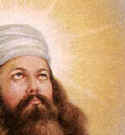Marriage
Marriage, particularly what Zarathushtra says on the topic of marriage, and specifically how his teachings address the issue of marrying within one’s own faith, are perhaps just as controversial and as hotly debated issues within the Zoroastrian community today as the issue of conversion.
Again, let us turn our attention back to Zarathushtra and his teachings:
Yasna 53, also known as the "Marriage Yasna" is the only place within the Gathas where Zarathushtra addresses the issue of marriage.
The occasion is the wedding of Zarathushtra’s youngest daughter, Pouru-Chista, over which, he is presumably presiding.
He starts this Yasna with two verses of veneration and praise to Ahura Mazda and all those who have helped bring about renovation.
Then in Yasna 53-3 he addresses his daughter. In this verse, he simply asks her if she has made her choice of a spouse wisely, consulting her Best Wisdom, and having perfect trust in her Vohu Mana? Is she making this choice with all her inner parts being in harmony with one another, and with love instilled in her heart and her very essence?
In Yasna 53-4 Pouru-Chista replies that she has tried to follow the teachings of this faith, and as such has consulted her Vohu Mana. Now she commits herself to a lifetime of honoring her spouse as a father (presumably to her children) and as a husband. Furthermore, she will continue to strive to be righteous to all people, and will try her utmost to live according to the directives of her Good Mind.
In Yasna 53-5, Zarathushtra addresses all newly weds, telling them to cherish each other with righteousness, and to surpass each other in being righteous. This is the only way they would be able to reap the benefits and bliss of a good life.
In the remaining verses of Yasna 53, Zarathushtra turns his attention to all those gathered, and advises them on the doctrines of his teachings, outlining their freedom of choice between good and evil, and the inevitable outcome of each choice.
On the topic of Marriage, there is nothing more that has come down to us that can be directly attributed to Zarathushtra. However, even within these few verses, there is a wealth of information implicitly available. Let us look at a few.
Zarathushtra address his youngest daughter, simply as an individual endowed with the faculty of the Good Mind, with complete freedom of choice. This has two major implications:
She being of female gender is addressed just as any other individual, emphasizing that in the eyes of Zarathushtra, there was no gender distinction or superiority.
Her also being the youngest child implies that Zarathushtra treated all his children equally without any discrimination based on age or seniority.
In these verses, while Zarathushtra outlines Pouru-Chista’s lineage and family, there is no mention of the groom. While this is somewhat unusual, it imparts the implication that there is no prescriptive directive as to whom Pouru-Chista should have chosen (other than the spiritual attributes outlined above.) Presumably, the groom could have been younger or older, poorer or richer, of a stately background or from the peasantry or any other class or cast or race or religion, so long as the two of them chose each other with the counsel of the Good Mind, and with the goal of surpassing each other in righteousness.
In itself, this omission is not an endorsement of any type of social behavior; neither can it be a basis for legitimization of any socially instituted customs. Here again, we are left with no prescriptions from Zarathushtra, and with only one recourse… to consult with our own Good Mind and to choose for ourselves, accepting full responsibility for our choices.
To sum up, Zarathushtra (at least according to these verses) was only concerned with the moral character of brides and bridegrooms. He was not at all concerned with their gender, age, cast, race or religion. And he left the final choice of a spouse to each individual, only asking them to choose based on the guidance of their own Good Mind.
It is therefore safe to conclude that any other ceremonial observance, ritualistic liturgies or doctrinal directives were either in existence prior to the time and teachings of Zarathushtra and eventually crept back into the religion originated from him, or were later additions based on the interpretations of the ruling clergy, and/or social needs of later times. To claim that these were teachings of Zarathushtra, which were lost later, but preserved by oral or any other tradition is merely speculation, just as valid or as inappropriate as denying the same.
Ó Shahriar Shahriari
Vancouver Canada
January 4, 1999
